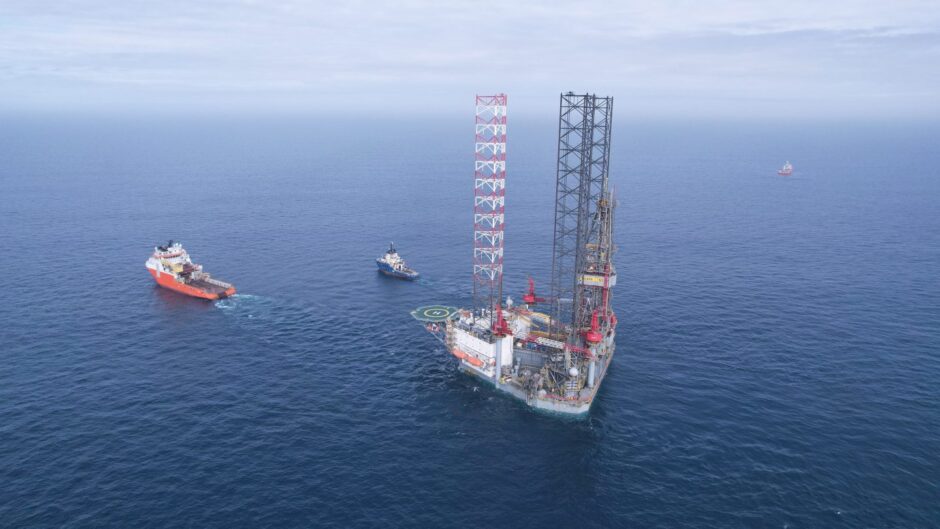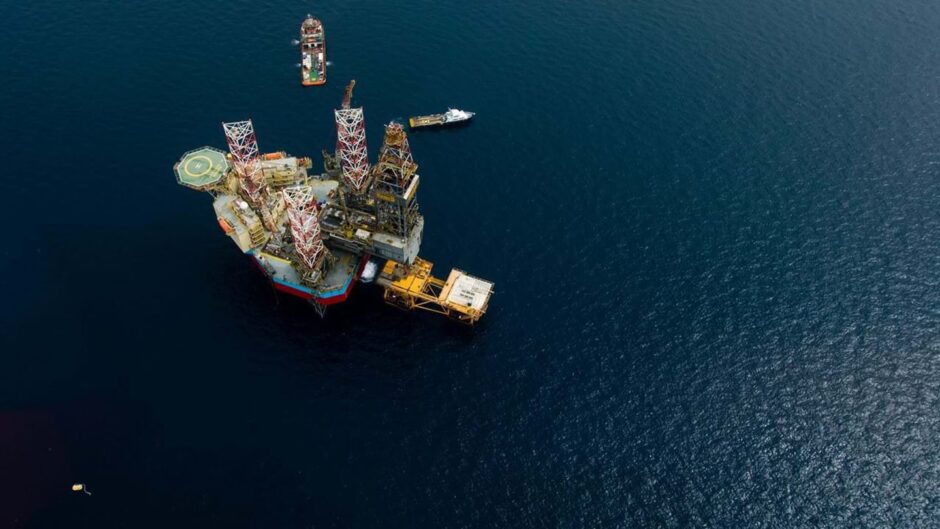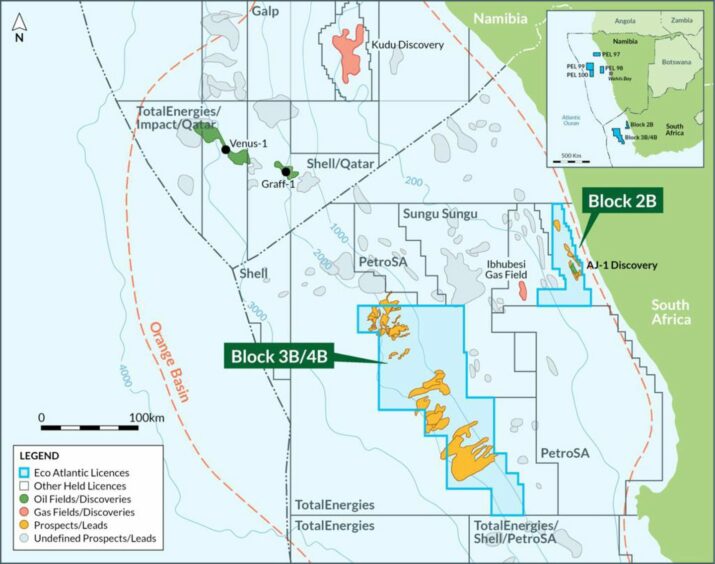
Ahead of the Autumn Budget, Deltic Energy (AIM: DELT) named Andrew Nunn as its new CEO, however, UK fiscal changes leave him tough questions to answer.
The day following the budget Deltic announced its joint venture Selene project would be downgrading its estimated ultimate recoverable (EUR) resources of 131 billion cubic feet (BCF) at 50% probability (P50). Previously, it was said to be around 300 BCF.
The North Sea explorer owns 25% of this project and South Korea’s Dana bought out a 25% share in February, with London-based supermajor Shell (LON: SHEL) operating the project and claiming the remaining half.
However, as the firm is “tiny company” Deltic is weighing up farming down its stake in Selene in order to reach final investment decision on the project, the firm’s CEO explained.
Nunn told Energy Voice: “We’re trading at well under valuation and the reality of Deltic trying to take 25% of, even what is relatively modest development now, it’s still quite a stretch.
“So, certainly selling down or farming down an element to get carried through to first gas is very much on the cards and certainly an option we’ll explore rather than having to go back to investors and ask them for more money to continue through to development.”
Who’s buying a stake in Selene?
Given the specifics of the Selene project, Nunn is confident that if his firm pursues farm down a buyer will be found.
He questioned: “Where do we see problems with investment in the UK at the moment?
“It tends to be the big standalone projects that need new pipelines to shore, or multi-billion-pound capex.
“So, Cambo, Pensacola, they’re all in the same quite big ask sort of budget for even big industry partners to get involved in. Selene is very different, it’s a simple tie back to existing infrastructure.”
Nunn argued that there “is always a market for that sort of thing”, especially as Selene can defer liabilities onto the Barque and Clipper projects, which are not owned by Deltic, which provides “value over and above the gas itself”.
He argued “big international companies” are unlikely to show interest in picking up a stake in Selene as “the UK is quite uncompetitive compared to other markets.”
Nunn said that firms with a portfolio centralised in the UK are more likely to show interest.
Pensacola losses
Earlier this year, Deltic took a £18 million hit when it couldn’t find a partner for its Pensacola project in the North Sea.
Nunn commented: “It was really disappointing to lose that project, but we were trying to fund that in a very difficult period in the market. In the run up to the election, there was uncertainty about what the EPL [energy profits levy] was doing under the previous government.
“Nobody could run their economics because they didn’t know what the tax was, and it was also a much bigger project. It needed appraisal wells, it was a billion plus of capex and when you can’t run your economics, it’s very difficult to convince anybody to invest in that sort of project.
“That is why with Pensacola, we couldn’t get that funding over the line.”
Deltic withdrew from the licence due to political uncertainty in the UK at the time which meant that the company was unable to find a partner, Nunn argued..
Pensacola was once confirmed as the largest discovery in the southern North Sea in a decade, holding around 72.6m barrels of oil equivalent.
Nunn too impressed with UK tax
Nunn’s predecessor Graham Swindells had been outspoken about his objections to the UK’s energy profits levy (EPL) and even as the firm pursues international opportunities, the new Deltic CEO intends to keep fighting for domestic oil and gas production.
He explained: “All of the team, we’re based in the UK, we’ve all worked in the UK, we like working in the UK.
“We see that potential and, all things being equal, we’d prefer to be a UK-based company working for the benefit of the community we live in.
“If the playing field was level, we wouldn’t be looking overseas but the reality is the EPL introduced quite an unlevel playing field and our investors are telling us we can’t continue to invest in the UK. So therefore, we have to go overseas.”
Nunn explained that the decision does not come down to his firm “choosing to leave the UK” and he said that “we wouldn’t have done it without that motivation.”
Potential positives from Autumn Statement
Last month chancellor Rachel Reeves delivered Labour’s first budget in 14 years and confirmed the previously announced tax hike for oil and gas operators within the UK.
The headline rate of tax was brought to 78% as the EPL’s investment incentives were discarded, however, the Labour government maintained the levy’s capital allowances.
Previously, Wood Mac senior analyst James Reid had explained the importance of the capital allowances under the EPL to getting new projects off the ground.
He told Energy Voice earlier in the year: “For a pre-production project, losing those capital allowances would significantly harm the economics of these projects.”
The retention of this allowance came as a good sign to the new Deltic boss, and he hopes that the government is beginning to listen to the concerns of the oil and gas industry.
Nunn commented: “It’s interesting the way the budget went. In the end, they didn’t put forward some of the stuff that was put forward in opposition so I’m wondering whether they are starting to realize that they may have made a misstep there and starting to come back towards supporting the industry a little bit more.”
No new UK projects as US offers quick cash
Despite this, the oil and gas operator has decided to look to more welcoming fiscal climates for new projects.
The Deltic boss added: “I think at this point in time, we have no intention of originating any new projects.”
However, the firm plans to continue with its current projects, including the Blackadder license that it won in the UK’s 33rd licencing round.
When questioned about his firm’s position on UK development, Nunn answered: ” If you’re asking me whether we would start again through a new licensing round or invest in projects out with our existing portfolio, I think the answer in the short term is no.”
The firm has recently shared ambitions to move into the United States to generate cash though onshore oil and gas exploration.
Over the course of the US election, Nunn was unconcerned about the outcome as projects like the ones his firm is targeting have been unaffected by shifts in power between political parties.
“To be honest, it probably doesn’t make that much difference,” he explained.
“Certainly, the projects we’ve been looking at on the onshore US have continued regardless of who’s been in power over the last few years.
“These are basins that have been producing for 70-odd years. I don’t think we see a major shift in whether it’s supportive, or unsupportive.
“But the reason the US is an area of interest is the ability to get in at a very low cost given where we are as a company these days.”
He explained that for a “few £100,000” a firm can have a project online in “6-8 weeks” while investing on a “well by well basis” in the US, making the country appealing.
“That’s why the US is of interest in the short term,” Nunn added, “just to generate some short-term revenue cash flow and stabilise Deltic’s G&A [general and administrative] costs while we actually go off and do the things we really like to do, which is the bigger exploration stuff.”
Africa offers new opportunities
Deltic has demonstrated a positive track record with its explorations, Nunn argued, and now he looks to use this to break into Africa.
Namibia and the Orange basin were two areas where Nunn described “big wins” being available, however, the Deltic boss is also looking to other regions of the continent.
“We also see other areas where governments are looking to encourage smaller companies to come in, which they haven’t historically done,” he added.
“I have highlighted Angola as one which has quite interesting geology, lots of upside, but also politically. The maturity of the industry in Angola is sort of where the North Sea was 15 to 20 years ago where you’re starting to see the majors looking for the door and then leaving opportunities for smaller companies behind.”
The firm is looking for merger and acquisition (M&A) deals to appease shareholders as they call for speedy return on investment.
Nunn explained: “I don’t think we’ll go in through licencing rounds, it’s just that the cycle times are so long and as we know, these days investor patience is very short.”
He said that “realistically” the firm will be “going in alongside people that are out there already operating on the ground where we think we can add some geological firepower.”
Recommended for you

 © Supplied by Deltic Energy
© Supplied by Deltic Energy © Supplied by Noble
© Supplied by Noble © Shutterstock Feed
© Shutterstock Feed © Photographer: Scott Olson/Getty
© Photographer: Scott Olson/Getty © Supplied by Eco Atlantic
© Supplied by Eco Atlantic